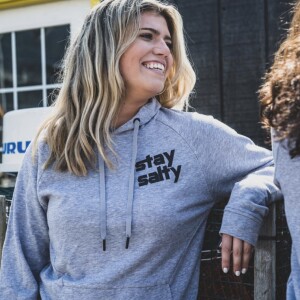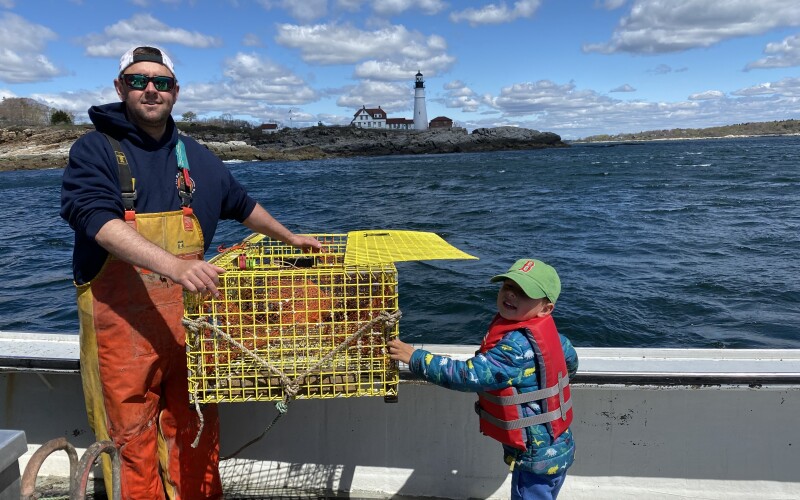Curt Brown’s love for fishing began in his father's wooden skiff in Peabbles Cove, Cape Elizabeth, Maine. He and his father would haul 10 to 15 traps after work and school days, which began his fascination with the different species of fish and sea urchins that were caught alongside the lobsters and crabs.
“There’s nothing more magical as an eight-year-old seeing lobster traps come up from the bottom of the ocean for the first time,” Brown said.
The ocean provides a new world of curiosity for all, a phenomenon that sparked his career path. Before purchasing his first boat and pursuing master’s degrees in marine biology and marine policy at the University of Maine, Brown had the opportunity to learn the ins and outs of commercial lobstering through his high school mentor, Tim Holden. “My heroes growing up were the guys with the big boats fishing up and down Casco Bay. I had two real passions- lobstering and marine biology.”
It's no shock that science and industry often clash. Still, one of the things that genuinely radiates from Brown is his motivation to improve the understanding of lobster as a sustainable resource and scientists' understanding of what goes on in the water from a fishing perspective.
In 2015, Brown joined the Ready Seafood team to hit the ground running, looking at the early stages of the lobster lifecycle in collaboration with the University of Maine. The Maine Sea Grant funded the project for two years, but Brown and Ready Seafood decided the results were too interesting to let the project end.

They found a new depth and understanding of where young lobsters could survive and took on funding for the project. Ready Seafood became the first private company to fund public lobster research, gaining help from some of their suppliers and buyers.
Through these projects and working with third-party sustainability organizations, Brown has taught others about all aspects of the lobster industry, “it is probably one of the most rewarding things – the ability to be a lobsterman and share the research and experience with our customers around the world. It’s something that I take a lot of pride in.”
When people think about the state of Maine, they think of lobster. When you look at the coastal communities from Kittery to Cutler, it is the one economic, cultural, and social driver in this state.
“It’s everything from boats out on the water, dealers, wholesalers, trucking companies, restaurants, to shops. It’s truly our whole economy.” Brown said.
Brown is the current co-chair of the SEA Maine, a network of companies, organizations, and individuals dedicated to the growth of the marine economy in Maine. The mission of SEA Maine is to ensure that the Maine seafood, fishing, and aquaculture industries and the natural and innovative ecosystems they depend on are healthy and benefit the community.
In addition, Brown has been working tirelessly on policy and sustainability initiatives to preserve this way of life for his children and future generations.
“Facing the North Atlantic right whale issue, specifically over the last five years, motivated me to keep going. And, of course, having my two kids, Finn (8) and Clara (6), who will get up with me at 4:30 in the morning and head out lobstering, keeps me going.”
In April 2023, Brown traveled to Washington, DC, to testify on behalf of Maine’s lobster industry, opposing a bill that would have jeopardized the future of Maine’s lobster fishery.
He shared the long history of conservation efforts he has faced as a fisherman within this tight-knit community. Brown spent his last $100 in his senior year of high school to buy whale-safe gear to ensure he could go lobstering that upcoming summer. Along with many other fishermen in the state, he has provided safety to the remaining right whale species.
“The take-home message of my testimony today is that this method has worked, and if there are two numbers you remember, remember zero and zero,” Brown said. “There have been zero documented entanglements of a right whale in Maine lobster gear since 2004, and there have been zero documented mortalities associated with Maine lobster gear ever.”
Brown has not only been a role model for the younger generation of fishermen but has continued to fight for an industry that has raised and supported so many Maine families.
“It has always been about the future of our state, and personally, for my family, it’s the look in my kids’ eyes when they are out on the water that makes me fight for this industry. It motivates me to keep mending the gap between science and fishing.”

Brown refrains from taking credit for his countless hours advocating for Maine lobstering; however, his efforts have not gone unnoticed in the community.
“He is a stalwart advocate for the industry, a talented marine scientist and educator, and has spent so much of the last several years traveling around the country educating people about Maine’s 100-plus years of commitment to sustaining the lobster resource and marine environment,” said Annie Tselikis, executive director of the Maine Lobster Dealers’ Association.
Brown says this way of life has shaped him: “It was never an option in my mind growing up in this industry to lose what we have. What we have here is so special and so rare.”







